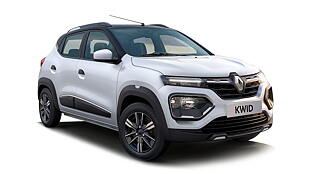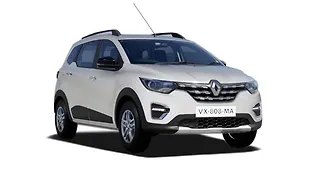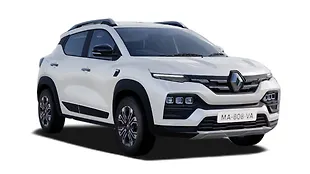Introduction

Renault India’s ticket to the flourishing entry-level budget car segment is the Kwid; a cheap and cheerful small car that seems to have plenty going for it. On paper, the Kwid checks all the right boxes and it certainly looks the part with its butch albeit eccentric design and competitive prices. But moving beyond these seemingly fundamental traits, it remains to be seen how well the Kwid performs as a volume seller in a market where it has to be in close proximity to cars like the Maruti Suzuki Alto 800 and the Hyundai Eon.
Design and Style
Unlike Renault India’s other hatchback, the Pulse, which is essentially a reskinned Nissan Micra, the Kwid is an entirely new product and it shows the moment you lay your eyes on it. It is, after all, based on the brand’s CMF-A platform that offers a high degree of flexibility for potential body styles to match specific customer needs and preferences in developing markets like India. This platform eventually will spawn Datsun’s budget crossover, the Redi-Go that’s currently under tests.

Coming back to the Kwid, Renault has managed to deceive what’s basically a city runabout into a rugged looking car. Although that’s partially down to the high ground clearance and the chunky wheel well. The SUV-like design traits are plastered all across the car, be it the upright front grille, heavy plastic cladding or the utilitarian looking bits like the wing mirrors and the door handles.
On the sides, the Duster-like high bonnet line and thick C-pillars complete the masculine stance although what seriously restrict the Kwid from mimicking the bigger Duster are the puny 13-inch wheels. Renault could easily do with 14-inchers given the car’s fairly large wheel well.
Compared to the competition, the Kwid has the highest ground clearance at 180mm, which highlights its appeal as more of a utilitarian offering than an out-and-out small car. Now this ruggedness may not fare well with those looking for a typical city car but for those who also fancy a little bit of quirk for their money, the Kwid makes for a convincing choice.

Interiors

The cabin is a sea of black and grey plastics but it’s no bad thing since most of the plastic bits are hardwearing. Also, Renault has kindly added contrasting red inserts for the seat backrests and piano finish for the centre console which do their bit in lifting up the cabin’s otherwise drab ambience. In this day and age of layered dashboard designs and copious amount of knobs and switches, the Kwid’s minimalistic interior comes as a refresher although the general lack of knobs and switches is hardly surprising given the car’s budget positioning.
As for practicality, the cabin is littered with storage spaces including two glove boxes and a scooped out storage bin in the middle, besides door pockets in the front door pads and in between the front seats. Speaking of which, seat comfort up front is good for a car of this size, with adequate bolstering and back support. Thanks to the class-leading 2422mm of wheelbase, even the nearly flat rear bench is comfortable with decent leg room and thigh support. That being said, the rear is only comfortable for two adults. Adding a third occupant in the rear in this narrow cabin is best avoided.
If the cabin space doesn’t leave you impressed, the 300-litre boot certainly will. The Kwid’s boot, in fact, is comparable to hatchbacks costing twice as much. Better still; with the rear seats folded, it can swallow up to 1,115-litre worth of luggage which is impressive indeed.

Safety and Equipment

Standard equipment is sparse, but the Kwid does get a few segment-first features such as the 7-inch infotainment system, GPS navigation and a digital instrument cluster. The 7-inch touchscreen infotainment system has been taken off Renault’s bigger model and in here it works just as seamlessly. The UI is easy to navigate and the fonts are large and clear, making the system really intuitive to use. The only downer here is the disappointing audio quality which will only get worse in case either of the two speakers goes kaput, as it did in our test car.
The other highlighting feature is the driver-friendly digital instrument cluster that includes a large speedometer and fuel gauge. As for rest of the features on our top-spec RXT test car, it has front fog lamps, front power windows and remote locking as standard.
The lack of general safety features in entry-level small cars in India is upsetting and sadly, the Kwid is no different. Renault is only offering a driver’s side airbag as an optional extra on the top-spec RXT variant. What’s more, the Kwid doesn’t even get ABS as an option. Given the choice, we would gladly opt for ABS over the big touchscreen infotainment system.

Engine, Performance and Braking

Powering this car is a 799cc, three-cylinder petrol engine. With around 54bhp of power, this 12-valve unit may seem measly but 54bhp is all the power the Kwid really needs because at 670kg, the car’s a featherweight. However, it doesn’t leave a very convincing impression when you set off from standstill. At low speeds it is noticeably jerky and there are big flat spots that ought to be eliminated with more throttle input. But at a higher pace, the power delivery gets relatively smoother and the 72Nm of torque onboard allows the Kwid to keep up with city traffic without any fuss.
Despite its lack of outright grunt, the Kwid is adequately lively out on the highway as well. The featherweight Renault, in fact, has no trouble hitting triple digit speeds and it's only post 120kmph that it starts to feel that it’s struggling to gain momentum. With a 0-100kmph sprint time of 17.93 seconds (as tested), the Kwid is hardly a speed machine but it’s adequately potent where it matters i.e. within the city limits.

Perhaps the least impressive bit of the drivetrain is the 5-speed manual gearbox. While it’s fairly easy to use as changing gears require minimal effort, the gearshift quality is slightly rubbery and not as slick as the Maruti Alto 800.
Renault is offering disc brakes at the front and drum brakes at the back and despite the lack of ABS, the Kwid boasts of good stopping power and manages to shed speed in a controlled manner. To put it into numbers, 80-0kmph takes 3.22 seconds which is right on par with the competition.
Ride and Handling

Driving the Kwid spiritedly is a little different experience compared to the competition in a few ways. The combination of a high stance and long travel suspension lets this small car lean a little bit more through the corners, taking away a bit of the planted feel that can be had in something like a Maruti Alto 800 that sits relatively closer to the ground.
Not helping matters in any way is the vaguely assisted steering that feels sharp on centre but gives little feedback at turn-ins. Ultimately, the steering feel is a bit distant and almost like a simulation, which is not exactly a good thing. Combine this with the high stance and the Kwid requires constant attention from the driver at high speeds, especially in crosswinds.
Unfortunately, changing directions is not one of the Kwid’s strong suits but when it comes to tackling bad roads, it is hard to fault. The long travel suspension that otherwise makes the Kwid lean into the corners now allows it to maintain composure even over pothole-riddled roads. Sure, the ride quality is slightly bouncy under full load, it is still impressive overall and like the bigger Duster, the Kwid tackles most of the bad roads with relative ease, especially for a car of this size.
Price and Fuel Economy

Renault had us all in shock and awe when it announced the prices for the Kwid. After all, at Rs 2.56 lakh for the no-frills STD variant, the French automaker it seems is gunning for the core of the budget end of the market. At Rs 3.53 lakh, the top-spec Kwid RXT (O) costs over a lakh more than the Kwid STD but then, it also comes with a whole load of car for the money.
As for fuel economy, Renault is claiming 25.17kmpl for the Kwid while our test results had the car returning 15.6kmpl in the city and 21.4kmpl out on the highway – impressive figures, indeed, all thanks to the low kerb weight and well-spaced out gear ratios.
Verdict
Final Rating: 3.44/5

For a car designed to tackle the daily chores, Renault has covered many of the desired traits and wrapped them in an attractive looking package. With its SUV-esque design cues, spacious cabin and a frugal petrol engine, the Kwid is a legitimate contender in the burgeoning small car segment. Sure, it’s bit of an oddball when it comes to interior packaging and yes, Renault could do well by adding some safety equipment into the mix, however, there is no denying that the Kwid still offers quite a lot of car for relatively little.
Specifications
| CAR NAME | Renault Kwid |
| Variant | RXT Option |
| ENGINE | |
| Fuel | Petrol |
| Installation | Front, transverse |
| Displacement | 3 cyls, 799cc |
| Bore/stroke | 69/71.2mm |
| Valve gear | 4 valves per cyl |
| Power | 53.2bhp at 5678rpm |
| Torque | 72Nm at 4386rpm |
| Power to weight | 79.5bhp per tonne |
| Torque to weight | 107.6Nm per tonne |
| Gearbox | 5-speed manual |
| CHASSIS & BODY | |
| Kerb weight | 669kg |
| Tyres | 155/80 R13 |
| Spare | Full-size |
| STEERING | |
| Type | Rack and pinion |
| Type of assist | Electric |
| Turning circle | 10m |
| BRAKES | |
| Front | Discs |
| Rear | Drums |
| Anti-lock | No |
Test Data
| CAR NAME | Renault Kwid |
| Variant | RXT Option |
| PERFORMANCE & BRAKING | |
| 0-20kph | 1.25s |
| 0-40kph | 3.28s |
| 0-60kph | 6.78s |
| 0-80kph | 11.55s |
| 0-100kph | 17.93s |
| 0-120kph | 27.93s |
| 20-80kph in 3rd gear | 17.08s |
| 40-100kph in 4th gear | 26.38s |
| 80-0kph | 34.99m |
| FUEL ECONOMY | |
| City | 14kpl |
| Highway | 18kpl |
| Tank size | 28 liters |
| Range | 444.8km |
| INTERIOR MEASUREMENTS | |
| Front | |
| Legroom(Max/min) | 790/600mm |
| Headroom(Max/min) | 950mm |
| Shoulder room | 1220mm |
| Backrest height | 540mm |
| Rear | |
| Legroom(Max/min) | 810/620mm |
| Ideal legroom | 720mm |
| Headroom | 900mm |
| Shoulder room | 1200mm |
| Seat base length | 490mm |
| Backrest height | 500mm |
| Boot | 300litres |
| Length/width/height | 700/960/550mm |
| Loading lip height | 730mm |

![Renault Kwid [2015-2019] Image Renault Kwid [2015-2019] Image](https://imgd.aeplcdn.com/272x153/cw/ec/18713/Renault-Kwid-Exterior-132531.jpg?wm=0&q=80)
























